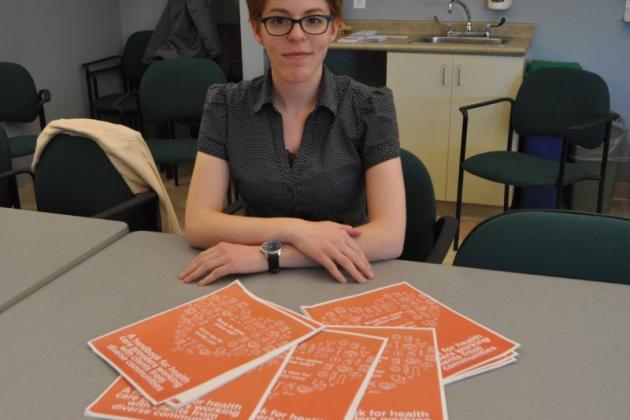
Source: Andrew Wagstaff | Amherst News
UPPER NAPPAN – Health care providers now have another tool to help them work with clients from diverse and marginalized communities.
Conor Falvey, provincial coordinator for Sexual Health Nova Scotia, presented a new handbook for doctors, nurses and any other health care worker interested in the resource, during a talk at the Cumberland Regional Health Care Centre on Thursday.
Titled “Ready for some pillow talk? Quick tips for quality care,” the handbook was put together an Action Canada for Sexual Health and Rights advisory committee, made up of health care providers and people from specific diverse communities such as indigenous communities, the LGBTQ community, newcomers, migrants and refugees, and people facing sizeism.
“It’s definitely a resource that is badly needed,” said Falvey. “I’ve run into so many well intentioned health care providers – doctors, nurses, people working in offices – who really want to provide good health care to people of different backgrounds, but they just don’t know where to start because they’re intimidated by the idea of changes they’re going to have to make, or afraid they’re going to make a mistake or say the wrong thing in front of their patient.”
Having a guidebook like this can give them a quick sense of how they can make some positive changes and get started on that process, according to Falvey.
While the book refers to 15 specific communities, including people living with HIV, people of colour, and people seeking pregnancy options and family planning, Falvey said the list could go on even further.
“One thing we talked about today is that there’s a section in it on youth, but not one on seniors, which is a big Nova Scotia percentage,” she said. “On the other hand, there are things in there with real quality information that will be really helpful to a lot of people.”
Falvey’s presentation was mainly to a class of Continuing Care Assistant students from Nova Scotia Community College, along with their instructors and some representatives from public health, and she hopes it will be the first of many presentations in different areas of the province.
Among those on hand was Ruthie Patriquin, executive director of the Sexual Health Centre of Cumberland County.
“It’s crucial that health care workers take advantage of reading it online because so many communities really don’t feel they’re getting the care they need, or don’t have access to the care they need,” said Patriquin. “For anyone who works in health care… it’s important we all recognize the needs of marginalized communities.”
The handbook is available for free online for anyone who wants to use it, at www.srhweek.ca.